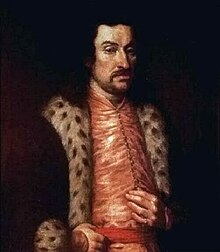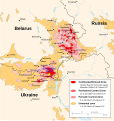Portal:Ukraine
The Ukraine Portal - Портал України
Ukraine Україна (Ukrainian) | |
|---|---|
| ISO 3166 code | UA |
Ukraine is a country in Eastern Europe. It is the second-largest European country after Russia, which borders it to the east and northeast. It also borders Belarus to the north; Poland and Slovakia to the west; Hungary, Romania and Moldova to the southwest; with a coastline along the Black Sea and the Sea of Azov to the south and southeast. Kyiv is the nation's capital and largest city, followed by Kharkiv, Dnipro, and Odesa. Ukraine's official language is Ukrainian.
During the Middle Ages, Ukraine was the site of early Slavic expansion and the area later became a key centre of East Slavic culture under the state of Kievan Rus', which emerged in the 9th century. The state eventually disintegrated into rival regional powers and was destroyed by the Mongol invasions of the 13th century. The area was then contested, divided, and ruled by a variety of external powers for the next 600 years, including the Polish–Lithuanian Commonwealth, the Austrian Empire, the Ottoman Empire, and the Tsardom of Russia. The Cossack Hetmanate emerged in central Ukraine in the 17th century, but was partitioned between Russia and Poland, and absorbed by the Russian Empire. Ukrainian nationalism developed and, following the Russian Revolution in 1917, the short-lived Ukrainian People's Republic was formed. The Bolsheviks consolidated control over much of the former empire and established the Ukrainian Soviet Socialist Republic, which became a constituent republic of the Soviet Union when it was formed in 1922. In the early 1930s, millions of Ukrainians died in the Holodomor, a human-made famine. The German occupation during World War II in Ukraine was devastating, with 7 million Ukrainian civilians killed, including most Ukrainian Jews.
Ukraine gained independence in 1991 as the Soviet Union dissolved, and declared itself neutral. A new constitution was adopted in 1996. A series of mass demonstrations, known as the Euromaidan, led to the establishment of a new government in 2014 after a revolution. Russia then unilaterally annexed Ukraine's Crimean Peninsula, and pro-Russian unrest culminated in a war in the Donbas between Russian-backed separatists and government forces in eastern Ukraine. Russia launched a full-scale invasion of Ukraine in 2022. Since the outbreak of war with Russia, Ukraine has continued to seek closer ties with the United States, European Union, and NATO.
Ukraine is a unitary state and its system of government is a semi-presidential republic. A developing country, it is the poorest country in Europe by nominal GDP per capita and corruption remains a significant issue. However, due to its extensive fertile land, pre-war Ukraine was one of the largest grain exporters in the world. Ukraine is considered a middle power in global affairs, and the Ukrainian Armed Force is the fifth largest armed force in the world in terms of both active personnel as well as total number of personnel with the eighth largest defence budget in the world. The Ukrainian Armed Forces also operates one of the largest and most diverse drone fleets in the world. It is a founding member of the United Nations, as well as a member of the Council of Europe, the World Trade Organization, and the OSCE. It is in the process of joining the European Union and has applied to join NATO. (Full article...)
In the news
- 19 November 2024 – Russian invasion of Ukraine
- Attacks in Russia during the Russian invasion of Ukraine
- Ukraine launches ATACMS ballistic missiles at targets in Bryansk Oblast, Russia, according to the Russian Defence Ministry. It is the first time that Ukraine has used the American-supplied missiles to strike targets inside Russia. (BBC News)
- German Taurus controversy
- German opposition politician Florian Hahn condemns German Chancellor Olaf Scholz's refusal to grant long-range Taurus missiles to the Ukrainian military. (The Kyiv Independent)
- Nuclear risk during the Russian invasion of Ukraine, Russia and weapons of mass destruction
- Russian President Vladimir Putin signs a decree that allows Russia to use nuclear weapons in response to conventional attacks by a non-nuclear state supported by a nuclear power. (Reuters)
- The United Kingdom and France both prepare new military packages containing long-range missiles to send to Ukraine following United States President Joe Biden's decision to allow deep strikes into Russian territory using American weapons. (Newsweek)
- 18 November 2024 – Russian invasion of Ukraine
- Russian strikes against Ukrainian infrastructure
- Odesa strikes
- Russian forces launch a missile attack on the city of Odesa, Ukraine, for the second consecutive day, killing at least ten civilians, injuring dozens of others and damaging civilian infrastructure, including residential buildings. (Ukrainska Pravda)
Featured pictures
Did you know (auto-generated)

- ... that one of Ukraine's largest power plants was mostly destroyed by Russians in March 2024?
- ... that Ukrainian science fiction and fantasy is written both in Ukrainian and Russian?
- ... that a Ukrainian soldier has written a song dedicated to the Turkish combat drone Bayraktar TB2?
- ... that Oleksandr Kamyshin, the head of Ukrainian Railways, who runs the iron diplomacy program that brings world leaders to Kyiv by rail, carries his gun and his son's stuffed owl with him?
- ... that the Ukrainian composer Borys Lyatoshynsky composed his second opera, Shchors in 1937–38, about a military figure from Ukraine who fought for the Soviet Red Army in the Ukrainian–Soviet War?
- ... that more than 200 Nobel Prize laureates have signed a letter against the war in Ukraine?
More did you know -
- ... that the Khreschatyk is the main street of Ukrainian capital Kyiv on which Orange Revolution and other historical events mainly took place?
- ... that Ukrainian naturalist, lecturer, artist and author John Lhotsky was credited as the first discoverer of gold in New South Wales?
- ... that at its first years Kiev Zoo had to move its animals into the food storage of the main Kiev railway station for the winter?
- ... that Ukrainian composer Mykola Leontovych (pictured), known for the "Carol of the Bells", was nicknamed "Ukrainian Bach" in France?
- ... that although the secular music of Mykola Leontovych was well known in the twentieth century, the Liturgy of St. John Chrysostom was little known because of a ban on sacred music in the Soviet Union?
- ... that among many historic landmarks at the Andrew's Descent in Kyiv, there is a medieval Gothic style castle that locals call the "Castle of Richard the Lion Heart" due to the legend the 12th century King of England had visited the building?
Selected article -
Ukrainians (Ukrainian: українці, romanized: ukraintsi, pronounced [ʊkrɐˈjinʲts⁽ʲ⁾i]) are an East Slavic ethnic group native to Ukraine. Their native tongue is Ukrainian, and the majority adhere to the Eastern Orthodox Church. By total population, the Ukrainians form the second-largest Slavic ethnic group after the Russians.
Historically, under rule from various realms, the Ukrainians have been given various names by their rulers. Some of the states that have governed over the Ukrainian people include the Polish–Lithuanian Commonwealth, the Habsburg monarchy, the Austrian Empire, and then Austria-Hungary. The East Slavic population inhabiting the territories of modern-day Ukraine were known as Ruthenians, referring to the territory of Ruthenia; the Ukrainians living under the Russian Empire were known as Little Russians, named after the territory of Little Russia. (Full article...)
In the news
- 19 November 2024 – Russian invasion of Ukraine
- Attacks in Russia during the Russian invasion of Ukraine
- Ukraine launches ATACMS ballistic missiles at targets in Bryansk Oblast, Russia, according to the Russian Defence Ministry. It is the first time that Ukraine has used the American-supplied missiles to strike targets inside Russia. (BBC News)
- German Taurus controversy
- German opposition politician Florian Hahn condemns German Chancellor Olaf Scholz's refusal to grant long-range Taurus missiles to the Ukrainian military. (The Kyiv Independent)
- Nuclear risk during the Russian invasion of Ukraine, Russia and weapons of mass destruction
- Russian President Vladimir Putin signs a decree that allows Russia to use nuclear weapons in response to conventional attacks by a non-nuclear state supported by a nuclear power. (Reuters)
- The United Kingdom and France both prepare new military packages containing long-range missiles to send to Ukraine following United States President Joe Biden's decision to allow deep strikes into Russian territory using American weapons. (Newsweek)
- 18 November 2024 – Russian invasion of Ukraine
- Russian strikes against Ukrainian infrastructure
- Odesa strikes
- Russian forces launch a missile attack on the city of Odesa, Ukraine, for the second consecutive day, killing at least ten civilians, injuring dozens of others and damaging civilian infrastructure, including residential buildings. (Ukrainska Pravda)
Selected anniversaries for November
- November 11—November 12, 1918 — Battle of Przemyśl was fought between Polish and Ukrainian forces.
- November 24, 2007 - the official day of remembrance for people who died as a result of Holodomor and political repression.
Photo gallery
Related portals
Religions in Ukraine
Post Soviet states
Other countries
WikiProjects and collaborations
Associated Wikimedia
The following Wikimedia Foundation sister projects provide more on this subject:
-
Commons
Free media repository -
Wikibooks
Free textbooks and manuals -
Wikidata
Free knowledge base -
Wikinews
Free-content news -
Wikiquote
Collection of quotations -
Wikisource
Free-content library -
Wikiversity
Free learning tools -
Wikivoyage
Free travel guide -
Wiktionary
Dictionary and thesaurus


































































